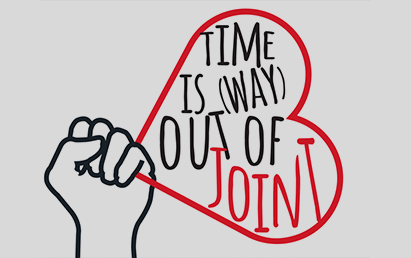2020 was a year like no other in our history. Global pandemic, political upheaval, and racial injustice have marred the view of the world in even the most hopeful and resilient of people. Since March 2020, many of us have been largely confined to our homes, carefully venturing out masked and keeping our distance from even friends and family. Although, as marriage and family therapists (MFTs), we are relational by nature, most of our interaction occurs in two dimensions on Zoom or FaceTime. When all of this turmoil began early in 2020, not many could seriously fathom it would still be going on into 2021. The uncertainty and isolation are exhausting, and no one should be surprised if at the end of the workday you are weary in a way that seems a little disconcerting. Research shows physical, psychological, and relational health deteriorate quickly when we don’t have hope. Now more than ever, this is a time when we need to look to each other, our families and communities for mutual support, understanding, and a sense of hope.
Hope as natural complement to MFT
Hope is a natural complement to the practice of MFT—a discipline that prioritizes systemic strength and health, as opposed to more individual therapy modalities from clinical psychology, that are focused on psychopathology and dysfunction. Many MFT classic models have traditionally had a hopeful focus, attempting to highlight positive aspects of client and relationships. This can be seen in solution-focused therapy with its search for exceptions (DeShazer, 1988), in strategic therapy with reframing (Watzlawick, Weakland, & Fisch, 1974), and in narrative therapy with a focus on unique outcomes and alternative stories (White, White, Wijaya, & Epston, 1990).
Couple and family therapists have known for years that instilling hope in clients plays an important role in galvanizing family members to improve their relationships. When it comes to MFT, hope can be contagious in a system. If hope is ignited in one member of the family system, it may spread like wildfire to motivate other people in the therapy. This system-wide hope can lead to increased collaboration and treatment compliance.
Hope also plays an important role during conflict situations by allowing a family member to be resilient and to not catastrophize. More hopeful family members can be less reactive, threatened, or rejected in situations when their loved one falters, or experiences doubt about the relationship. It can serve as a protective factor or adaptive mechanism to challenging relationship circumstances that families experience throughout the life cycle.
Sure, you could argue that there is a lot to feel hopeless about right now, and there’s a place for those feelings, too. However, we as MFTs must avoid getting stuck there in the hopelessness. If we can’t remain hopeful as systemic therapists ourselves, it’s hard to imagine being able to instill hope in our client systems in the New Year. Here are some practical ways to help clients (and yourself) tap into your hope reservoir for 2021.
MFT hope building techniques and interventions
Help develop new family rituals. Rituals are found across all cultures and have the power to reduce anxiety, alleviate emotional pain, provide opportunities to experience joy, and build relationships within communities. Family rituals are special events, such as celebrations, traditions, and patterned interactions, with a symbolic meaning shared by the whole family. They tap deeply into a family’s shared sense of identity and will tell you a lot about the functioning and health of the system. These rituals can be any organized gathering for some greater purpose, often featuring a ceremonial activity or component. Therapeutic rituals are different from the aforementioned types of rituals, in that therapeutic rituals do not necessarily involve everyday events or historical events accumulated over the years. Therapeutic rituals center more on creating new meanings for clients by either experiencing new situations or reevaluating situations within a different context. Couple and family therapeutic rituals can activate hope in MFT by helping families recall and celebrate the resilience and strengths within the system. The literature indicates that rituals can be useful in the therapeutic process by creating a new perspective, creating a new experience, or providing a safe way of communicating thoughts and feelings (Hecker & Schindler, 1994; Imber-Black, 1988; Imber-Black & Roberts, 1992).
 Conduct a “Hope History.” In addition to gauging the current level of hope in the system, this type of interview explores narratives of overcoming both individual and relational obstacles. It is designed to be used either at the beginning of therapy or anytime your client gets stuck and becomes hopeless. By tapping into previous and existing system-wide resources and significant others in the indirect system, the therapist can “prime the pump” to engender hope.
Conduct a “Hope History.” In addition to gauging the current level of hope in the system, this type of interview explores narratives of overcoming both individual and relational obstacles. It is designed to be used either at the beginning of therapy or anytime your client gets stuck and becomes hopeless. By tapping into previous and existing system-wide resources and significant others in the indirect system, the therapist can “prime the pump” to engender hope.
Locate a “Hope Mentor.” Hope thrives in the right company. We’re actually programmed to share in each other’s’ hopes and dreams. When you spend time with hopeful people, they show you the way! Hope mentors are people in the indirect therapy system with whom the therapist helps clients identify and connect in order to increase hope in their own lives. This relationship may lead to increased positivity and learning through listening to the mentor’s personal inspirational stories. Leading by example, the hope mentor models for the clients how to make interpersonal contacts, and introduces them to new opportunities, people, places, or ideas. In addition to modeling hopeful behaviors, these mentors express belief and confidence in the clients’ abilities and encourages them to take positive actions.
In addition to individuals, hope mentors may also take the form of entire couple and family systems. For instance, parents dealing with an out-of-control teen can learn coping strategies from other families who have navigated this difficult developmental stage. Sometimes, these mentor systems may have as much (if not more) hope induction ability and credibility than the actual MFT.
In addition to combating feelings of isolation and despair, this experience may increase vicarious hope in humanity and trusting relationships. Vicarious hope is the desire for something positive to happen to someone else. It switches our attention to how our actions might contribute to other people’s hopes, as well as our own. Ideally, the mentoring relationship would be a mutually beneficial one—as the mentor learns from the client and the client from the mentor.
In much the same fashion, therapists may also serve in an informal hope mentor role by appropriately self-disclosing about times in their own lives when they were able to connect to hope in order to improve their important relationships. When clients share vulnerability with a trusted source in a safe environment, they will have a potentially restorative, hopeful experience. Even if their problems aren’t solved by contact with this mentor, they will have a positive interaction with a caring individual or system.
Prioritize understanding over providing advice. When hearing clients ruminating on their hopelessness or expressing their negative feelings, what we often do is offer advice—telling them to do or not to do various things that we think would help. In contrast, what clients need in times of stress and uncertainty is not advice but understanding. Advice and directiveness in MFT practice certainly have their place, but advice before understanding is usually unhelpful. Providing advice without understanding one’s actual concerns may lead to increased stress and frustration. So, to be able to listen deeply, we have to be fully present with others and listen to them with hopeful intent.
Looking forward to 2021
In closing, it is important to remember that hope provides a positive outlook for an uncertain future, motivating us to look forward, amidst even distressing and sometimes tragic situations like we have experienced over the past year. Although it is certainly normal to feel some anxiety as MFTs, to find hope in the face of adversity is to see alternate possibilities within our new reality of 2021. Things will get better. We will find our way through this ordeal and become better because of it. I still feel so fortunate to work in what I consider to be the greatest profession around! MFTs are needed today more than ever before to connect our clients to hope. We are lucky to serve as hope merchants in the great marketplace of mental health, but first we must “buy it” in order to “sell it.” Finding some hope in this difficult time can help us see opportunities and cultivate a greater sense of connectedness to both ourselves and our clients.
Things will get better. We will find our way through this ordeal and become better because of it.

Eli Karam, PhD, LMFT, is an AAMFT Clinical Fellow, Approved Supervisor, and former AAMFT Board member. He is a tenured professor in the Couple & Family Therapy Program at the University of Louisville. He is also the host/co-executive producer of The AAMFT Podcast.
REFERENCES
De Shazer, S. (1988). Clues: Investigating solutions in brief therapy. New York: W. W. Norton & Co.
Hecker, L. L., & Schindler, M. (1994). The use of rituals in family therapy. Journal of Family Psychotherapy, 5(3), 1-24.
Imber-Black, E. (1988). Normative and therapeutic rituals in couples therapy. Rituals in Families and Family Therapy, 113-134.
Imber-Black, E., & Roberts, J. (1992). Rituals for our times: Celebrating, healing, and changing our lives and relationships. New York: Harper Perennial.
Watzlawick, P., Weakland, J. H., & Fisch, R. (1974). Change: Principles of problem formation and problem resolution. New York: W. W. Norton & Co.
White, M., White, M. K., Wijaya, M., & Epston, D. (1990). Narrative means to therapeutic ends. New York: W. W. Norton & Company.
Other articles
Therapeutic Activism
Family therapists have long used anomalies in therapy as the sparkling moments to generate workable goals and lasting change. For systemic thinkers, the anomalies of 2020 can catalyze our collective change, away from political neutrality and into sincere and compassionate political activism.
Lorien S. Jordan, PhD
Time is (Way) Out of Joint: On Systems, Politics, and Truth
It’s getting more difficult to set aside the notion of truth when untruth is such a powerful political weapon. Today, misinformation campaigns are targeting the nation’s confidence in many bedrock principles, such as the safety of vaccines and the trustworthiness of public health officials.
Aaron S. Cohn, PhD
Hope from a Systemic Perspective
We have been looking forward to the New Year with renewed hope and expectations that our society can move past the pandemic and work together toward healing. Systemic therapists bring a unique perspective to offer hope and healing because we understand the impact of trauma and change on family systems.
Jennifer Weniger, PhD



